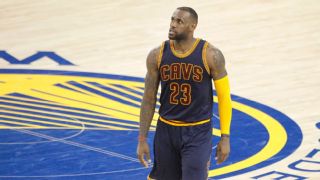Cleveland Cavaliers star LeBron James has called Muhammad Ali the greatest athlete of all time. But on Friday afternoon, hours before Ali died at age 74, James said it was Ali's work and influence outside the boxing ring that he will remember most, a sentiment he expressed again speaking to the media on Saturday .
"When I was a kid, I was amazed by what Ali did in the ring," James told ESPN.com on Friday. "As I got older and started to read about him and watch things about him, I started to realize what he did in the ring was secondary to what he meant outside of the ring -- just his influence, what he stood for."
James reiterated that sentiment Saturday.
"Obviously, we knew how great of a boxer he was, but I think that was only 20 percent of what made him as great as he was," James told reporters in Oakland. "What he stood for, I mean, it's a guy who basically had to give up a belt and relish everything that he had done because of what he believed in and ended up in jail because of his beliefs. It's a guy who stood up for so many different things throughout the times where it was so difficult for African-Americans to even walk in the streets."
As an African-American, James said Ali is largely responsible for his ability to enjoy not only fame and wealth as a professional athlete but also the opportunities that come with it.
"The reason why he's the GOAT is not because of what he did in the ring, which was unbelievable," James told ESPN.com, referring to the acronym commonly attached to Ali, which stands for "greatest of all time."
"It's what he did outside of the ring, what he believed in, what he stood for, along with Jim Brown and Oscar Robertson, Lew Alcindor -- obviously, who became Kareem [Abdul-Jabbar] -- Bill Russell, Jackie Robinson. Those guys stood for something. He's part of the reason why African-Americans today can do what we do in the sports world. We're free. They allow us to have access to anything we want. It's because of what they stood for, and Muhammad Ali was definitely the pioneer for that."
James said Saturday that Ali "paved the way for guys like myself."
"Today I can sit and go to China and make trips to China and all over the world and people know my name and know my face," James said. "I give all credit to Muhammad Ali because he was the first icon."
James spoke to ESPN.com on Friday after the Cavaliers practiced for Sunday's Game 2 of the NBA Finals (the Warriors lead 1-0). At 31, James is too young to have seen Ali fight, but he said he has watched footage of Ali on networks such as ESPN Classic.
On Aug. 28, 2010, James tweeted, "Muhammad Ali is the #greatestofalltime reguardless (sic) of sport. Nuff said!"

James has done plenty of charitable work in his hometown of Akron, Ohio, and has spoken out on several social issues, including once organizing a team photo of the Miami Heat players wearing hoodies after the killing of African-American teenager Trayvon Martin. James said Ali is one of the inspirations behind his efforts to use his fame and fortune to positively impact people outside of basketball.
"People forget what you did as a professional," James said Friday. "People forget the championships and all the other things you were able to accomplish. But they will never forget how you made them feel. That's a Maya Angelou quote, but I'll transcend that into what Muhammad Ali was able to do. So it's very important."
James said Saturday that not every athlete is driven to take a stand on social and cultural issues the way Ali did -- but that Ali's work serves as motivation for James to continue to speak out and be active in the community.
"I just think it's in you," James said of athletes speaking out. "If it's in you, then it will be brought to light. If it's not, then it won't. I would never compare myself to Muhammad Ali because I never had to go through what those guys had to go through back in those times. But in my own daily struggles, as I continue to say, growing up in the inner city, being a statistic that was supposed to go the other way and I'm able to sit up here today, and knowing that I was a guy who beat the odds -- it's just you never take for granted the path and the guys who just every single day just struggled in their individual lives, and everything they had to go through on a daily basis for us, for a guy like myself.
"Yes, I've had some adverse moments in my life, and yes, I've had to deal with a lot of things as a professional, and I've spoken up on a lot of issues that other athletes may not speak up on, but I feel it's my duty to carry on the legacy of the guys who did it before me."

